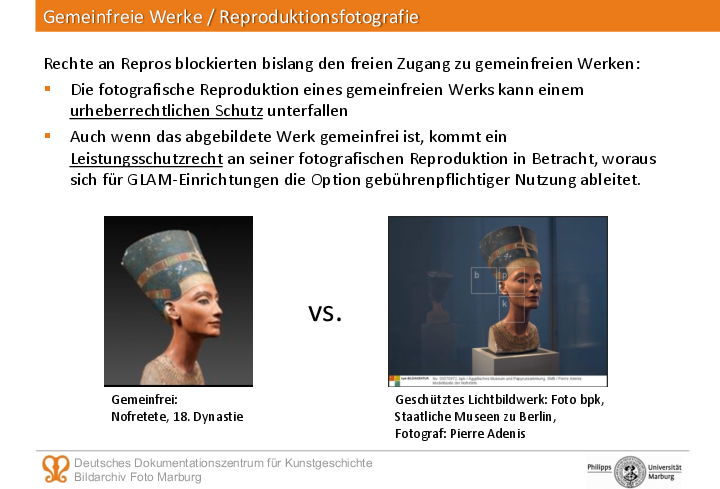Workshop Proceedings | 16. July 2021
Proceedings of the NFDI4Culture Copyright Symposium

Alte Holzwaage
"Alte Holzwaage, 1925/1945" Creator: Max Nowak, Owner: Deutsche Fotothek
Event date: June 10, 2021
Concept and organization: Fabian Rack
Moderation: Franziska Boehm and Sarah Pittroff
History of copyright: why are we where we are?
Grischka Petri (FIZ Karlsruhe/NFDI4Culture): Science and copyright: a necessary interaction.
The historical review focused on two areas where a conflict of interest between science and copyright typically arises, freedom of fact and freedom of use. This conflict of interest dates back to the privilege age, so it predates modern copyright legislation. The 16th century cases presented involved a dispute between two publishers over illustrations in herbal books and a dispute over the enforcement of printing privileges by Cambridge University against the Stationers' Company. To this day, it can be disputed whether information consists of free data or constitutes a creative work. Likewise, copyright barriers and exceptions for scholarly use are always up for debate.
Data Ethics
Dörte Schmidt (UdK Berlin) reports from the Cultural Advisory Board of NFDI4Culture, which is dedicated to ethical questions concerning sensitive cultural assets. She summarizes responses from the Board to a series of questions posed in advance:
- - What is the role of the CARE Principles, http://vad-ev.de/care-principles/?
- - What is the relationship between research data ethics and copyright? Provide examples from your perspective if possible.
- - Can digital reproductions help balance interests in restitution cases?
- - Can case groups of cultural appropriation be formed that one would like to prevent? What precedents are (or should be) used in the discussion?
- - Where do you see data ethics already legally anchored? Where do you see the biggest gaps?
- - How can data ethics be enforced in your view?

Panel from Law and Practice: Benefits and Sharing for Cultural Studies
What legal conditions do cultural studies find in the sharing and reuse of intangible cultural assets? What is changing with the recent reform of copyright law? And: Will GLAMs make use of these regulations?
Felicitas Kleinkopf (Center for Applied Legal Studies, Karlsruhe) and Christian Bracht (Bildarchiv Foto Marburg) gave impulses to these questions. Thomas Hartmann (FIZ Karlsruhe) moderated.
The Legal Helpdesk at NFDI4Culture
The workshop report of the Legal Helpdesk - represented by Grischka Petri, Oliver Vettermann and Franziska Boehm (all FIZ Karlsruhe/NFDI4culture) gave an insight into the general task and first progress in the development of supporting materials for the scientific community. These are largely determined by incoming requests - optionally also via the new contact form - and are processed in a bundled way. In addition, the experts curate already known or published materials, monitor ongoing legislative processes and current judgments (keyword: Law Monitor) or help with policy questions from institutions and politics.
Specifically, an insight was given into the guide on retro-digitization, which is currently in the revision phase in view of the copyright reform, and aspects of data protection law for research data. In the latter case, attention was drawn to the regular falling out of scope, information hidden in metadata, and the two-pronged nature of moral rights and data protection law. To this end, a handout and a flochart on privacy-compliant internal sharing and processing of research datasets were also developed. The extent to which this is suitable for inter- and intradisciplinary use in the scientific community is currently being evaluated.
For the future, the helpdesk plans to optimize internal processes and query management, including a stronger link to the expertise of non-legal experts of the helpdesk as well as the use of synergies in the legal section of the NFDI. In the future, it is also planned to link existing interfaces and/or interfaces to be created with GAIA-X or the European Open Science Cloud, insofar as this contributes to the legally secure documentation and use of research data under FAIR and CARE principles.
Licenses - A Guide to Creative Commons and 130 Frequently Asked Questions
The discussion between Dietmar Kammerer (University of Marburg) and Fabian Rack (FIZ Karlsruhe/iRights) focused on the history, present and future of open licenses. Dietmar Kammerer recalled the context of the emergence of Creative Commons licenses in 2001. Newly emerged online file-sharing networks or P2P networks (e.g. Napster, The Pirate Bay) led to a wave of lawsuits by the entertainment industry and a broad discussion about so-called "copyright piracy" at that time. In the scientific context, the "Budapest Open Access Initiative" was launched in 2001 with the aim of making research results freely available to the public; two years later, the "Berlin Declaration" extended this goal to cultural heritage institutions. The Creative Commons movement, in turn, was founded to make it easier for artists:inside to distribute their works through a set of modular licenses. The success of CC licenses has made them the standard in the scholarly open access sector as well.
Fabian Rack explained the principles of the CC modules and presented the new German Creative Commons FAQ - which was released that day - and addressed selected questions in more detail: How can open access conditions be realized with the help of the license model? Should public domain materials - i.e., materials that are not (no longer) protected by copyright - be licensed? Can I license my publication freely and openly if it contains non-free image citations? Finally, Fabian Rack and Dietmar Kammerer answered questions from the audience. Fabian Rack called for a "stress test" of the FAQ by the scientific community.
Visionary Thinking - A New Creative Ecosystem
Katharina de la Durantaye (FU Berlin) presented the "Memorandum on the Future of the Creative Ecosystem in Europe". The paper, written by renowned copyright experts, advocates, among other things, for shorter protection periods and for regulations specific to the kind of work. This visionary view of copyright was the conclusion of the symposium.
